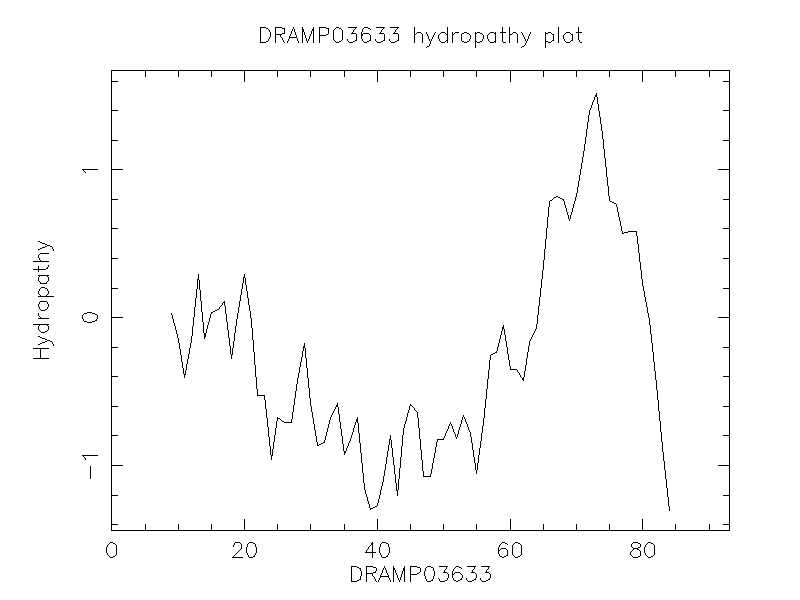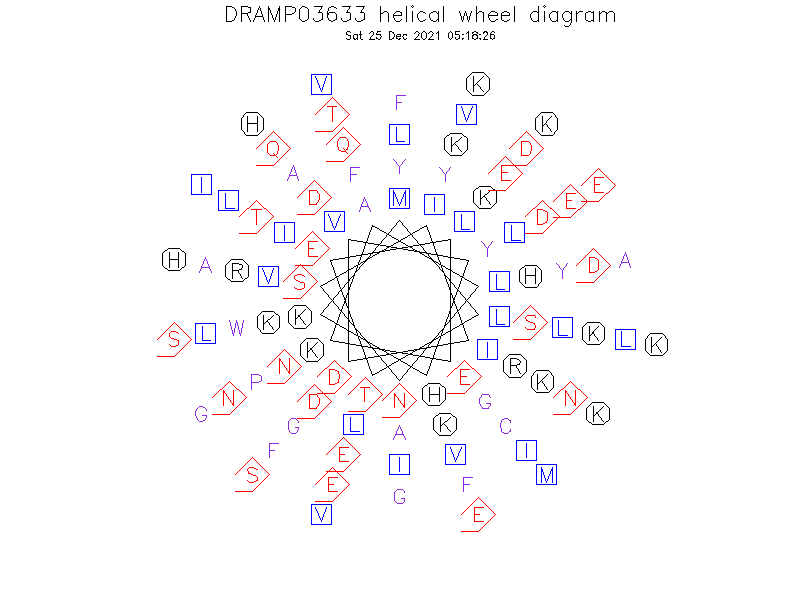General Information
-
DRAMP ID
- DRAMP03633
-
Peptide Name
- Protein S100-A8 (Calgranulin-A; MRP-8; Human, mammals, animals)
-
Source
- Homo sapiens (Human)
-
Family
- Belongs to the S-100 family
-
Gene
- S100A8
-
Sequence
- MLTELEKALNSIIDVYHKYSLIKGNFHAVYRDDLKKLLETECPQYIRKKGADVWFKELDINTDGAVNFQEFLILVIKMGVAAHKKSHEESHKE
-
Sequence Length
- 93
-
Protein Existence
- Protein level
Activity Information
-
Biological Activity
- Antimicrobial, Antibacterial, Antifungal
-
Target Organism
- No MICs found in DRAMP database
-
Hemolytic Activity
-
- No hemolysis information or data found in the reference(s) presented in this entry
-
Cytotoxicity
-
- Not included yet
-
Binding Target
- Metal-binding
Structure Information
-
Linear/Cyclic
- Not included yet
-
N-terminal Modification
- Not included yet
-
C-terminal Modification
- Not included yet
-
Nonterminal Modifications and Unusual Amino Acids
- Not included yet
-
Stereochemistry
- Not included yet
-
Structure
- Combine helix and strand structure
-
Structure Description
- The dimeric form of MRP8 is stabilized by hydrophobic interactions between mutually wrapped helices. There are two EF-hand motifs per monomer and each EF-hand bound one Ca(2+) with a different affinity [the affinity of the C-terminal EF-hand (EF-2) for Ca(2+) is stronger than that of the N-terminal EF-hand (EF-1)].
-
Helical Wheel Diagram
-
PDB ID
- 1MR8 resolved by X-ray.
- 1MR8->
-
Predicted Structure
- There is no predicted structure for DRAMP03633.
Physicochemical Information
-
Formula
- C492H774N128O141S3
Absent Amino Acids
- ?
Common Amino Acids
- K
Mass
- 10834.51
PI
- 6.5
Basic Residues
- 19
Acidic Residues
- 15
Hydrophobic Residues
- 34
Net Charge
- +4
-
Boman Index
- -150.13
Hydrophobicity
- -0.397
Aliphatic Index
- 96.45
Half Life
-
- Mammalian:30 hour
- Yeast:>20 hour
- E.coli:>10 hour
Extinction Coefficient Cystines
- 11460
Absorbance 280nm
- 124.57
Polar Residues
- 20
DRAMP03633

Comments Information
Function
- Has antimicrobial activity towards bacteria and fungi and exerts its antimicrobial activity probably via chelation of Zn2+ which is essential for microbial growth. Can induce cell death via autophagy and apoptosis and this occurs through the cross-talk of mitochondria and lysosomes via reactive oxygen species (ROS) and the process involves BNIP3. Can regulate neutrophil number and apoptosis by an anti-apoptotic effect.
Tissue specificity
- Calprotectin (S100A8/9) is predominantly expressed in myeloid cells.
Miscellaneous
- Binds two calcium ions per molecule with an affinity similar to that of the S100 proteins (By similarity).
Literature Information
- ·Literature 1
-
Title
- Two calcium-binding proteins in infiltrate macrophages of rheumatoid arthritis.
-
Pubmed ID
- 3313057
-
Reference
- Nature. 1987 Nov 5-11;330(6143):80-82.
-
Author
- Odink K, Cerletti N, Brüggen J, Clerc RG, Tarcsay L, Zwadlo G, Gerhards G, Schlegel R, Sorg C.
- ·Literature 2
-
Title
- The structure of human MRP8, a member of the S100 calcium-binding protein family, by MAD phasing at 1.9 A resolution.
-
Pubmed ID
- 10771424
-
Reference
- Acta Crystallogr D Biol Crystallogr. 2000 May;56(Pt 5):559-566.
-
Author
- Ishikawa K, Nakagawa A, Tanaka I, Suzuki M, Nishihira J.

